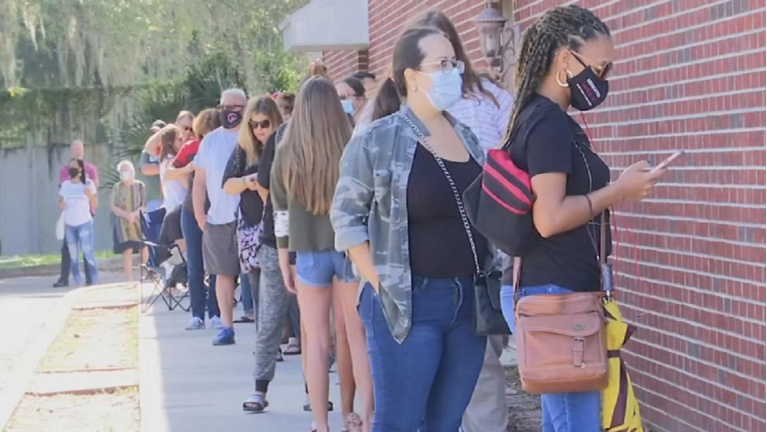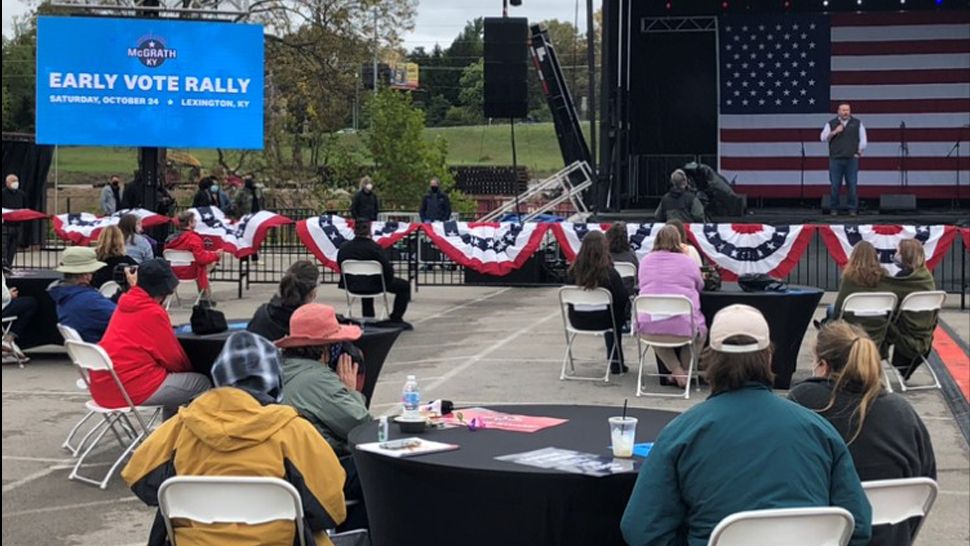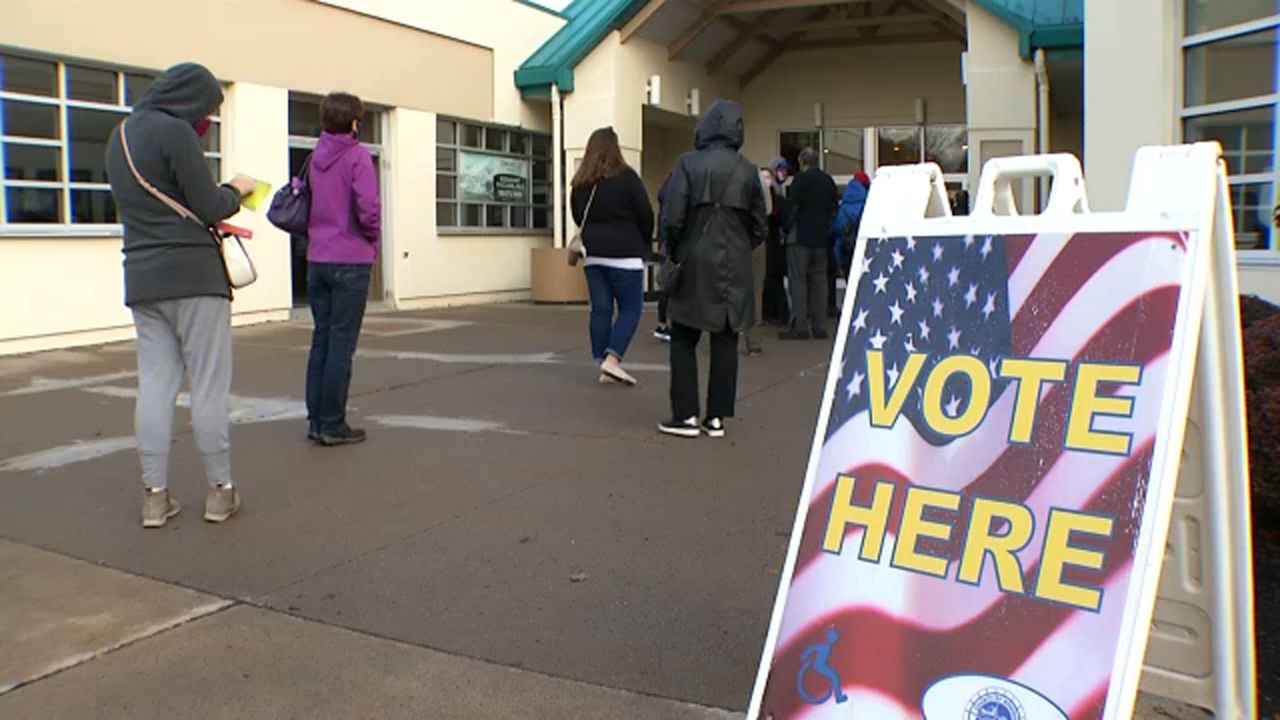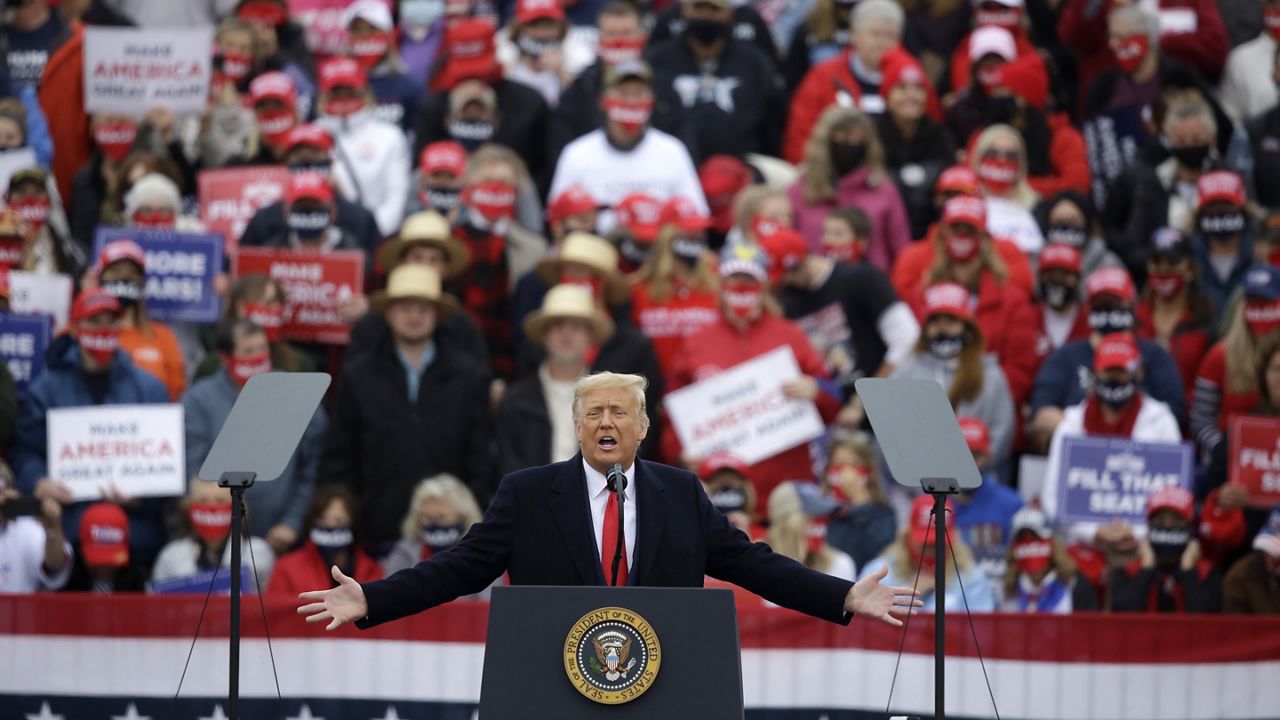LEXINGTON, Ky. – While Kentucky does not have a required dress code at polling places – something 10 other states do have – there are still many rules on the books detailing what voters can and cannot do while casting their in-person ballot.
What You Need To Know
- Kentucky does not have a polling place dress code
- Electioneering forbidden within 100 feet of polling place
- Secretary of State does not anticipate any problems at polls
- Fayette County Clerk has received only one complaint
Most states restrict campaigning, or electioneering, within a certain distance of a polling place, which is 100 feet in Kentucky. California, Delaware, Kansas, Montana, New Jersey, New York, South Carolina, Tennessee, Texas, and Vermont restrict apparel that endorses a political candidate. Elections officials in states with restrictions told the Associated Press clothing that violates the rules is not a big issue – most people who wear prohibited items to the polls are not aware of the law or forget, officials said, and comply with requests to cover up. Brett Mauthe, a Texas resident and supporter of President Donald Trump, was arrested in 2016 outside his polling place after he refused to cover up his black T-shirt with “50% basket of deplorables” on the front, a reference to a comment Hillary Clinton had made about Trump supporters. He argued his shirt was ambiguous in its support.
Kentucky Revised Statute 117.255 states no person shall electioneer at the polling place on the day of any election within a distance of 100 feet of any entrance to a building where a voting machine is located if that entrance is unlocked and is used by voters on Election Day. Electioneering includes displaying signs, distributing campaign literature, cards, or handbills, soliciting signatures to any petition, or soliciting votes for or against any bona fide candidate or ballot question in a manner that expressly advocates the election or defeat of the candidate or expressly advocates the passage or defeat of the ballot question. Exit polling, bumper stickers affixed to a person’s vehicle while parked within or passing through a distance of 100 feet of any entrance to a building in which a voting machine is located is not prohibited. Electioneering on private property within 100 feet of a polling place is an exception established by the State Board of Elections through the promulgation of administrative regulations.
KRS 117.255 also states no person other than the election officers, challengers, the person assisting voters, and a minor child in the company of a voter are permitted within the voting room while the vote is being polled.
With this year’s presidential election being more contentious than those in the past, Kentucky Secretary of State Michael Adams offered guidance to protect voters from intimidation at the polls and said he encourages people to know their rights before showing up to cast a ballot.
“Know and plan ahead how, when, and where you will vote,” Adams said. “Visit www.GoVoteKY.com to find information about your requested absentee ballot, voting early in-person, and voting on Election Day. Rely on trusted sources for election information, which in Kentucky are the Secretary of State’s Office, the State Board of Elections, and your county clerks.”
Kentucky law does allow the presence of “challengers” that may question the eligibility of a voter at the polls. Reasons a challenger may dispute a voter include the voter not being registered in the precinct, or is not the person he or she claims to be. If a challenger “challenges” a person’s right to vote, it is communicated to the precinct’s election officer and not the voter. The voter and challenger must both sign the Oath of Voter assistance form.
Challengers cannot electioneer or campaign, handle election materials, attempt to intimidate or harass a voter or precinct officer, behave in any manner to disrupt activities at the polling place, or attempt to interfere with the proper conduct of the election. Two challengers, one Republican one Democrat, are present at the polls.
“There is a process in Kentucky that allows for two challengers at every voting location, but there’s a vetting process for these individuals – they have to be approved by the two parties,” Admas said. “There's no provision in Kentucky law for just random people to be vigilantes and go police the election; that’s done by U.S. election officials, by law enforcement, and by individuals who have been nominated by the two parties to observe. Those are the only people that are going to be allowed at the polling locations.”
Polling place rules are enforced by the precinct’s election officer, designated as the “sheriff” and he or she is the person who oversees each polling place to preserve order and remove potentially disruptive persons. They are to ensure that only those persons allowed by law to be in the voting room are granted access. This person is also to report any potential election law offenses to the county clerk, county sheriff, or the Kentucky State Police.
“If you witness a problem at a polling place, you should not speak to or accost a voter to ‘enforce’ the law yourself,” Adams said. “Tense situations should be de-escalated, not escalated. Inform a precinct election officer to resolve the issue, or if you or another person is in immediate danger, call 911. Do not take matters into your own hands.”
Voter intimidation has been a topic of discussion this election after President Trump’s call for “poll watchers.” Voter intimidation is defined under Kentucky law as the use of threats, coercion, or attempts to intimidate for the purpose of interfering with the right of another person to vote or to vote for the person of their choosing.
“Voter intimidation can include physically blocking polling places, disrupting or interrogating voters, and spreading false information about voting requirements and procedures – this list is not exhaustive,” Adams said. “If you witness voter intimidation or other unlawful conduct at the polls, we recommend informing a precinct officer at the voting location, who will work to resolve any problems and call county election officials or local law enforcement, if needed. However, if you or anyone else is in immediate danger, call 911 first and then inform a poll worker if possible.”
Adams suggested documenting the situation, including the who, what, when, and where of the incident while keeping in mind the prohibited action of photographing a voter within the voting room.
“We’ve gotten no reports of voter intimidation whatsoever,” Adams said. “We monitor that every election and I don't think this election is going to be any different from prior elections. We just don't have a history of that sort of problem. That is a thing that has occurred in other states, voter intimidation efforts, but we've not seen that in Kentucky. We’ve already had voting going on for two and a half weeks, and we’ve seen no indication anywhere of that sort of activity.”
The Voter Protection Program, a group that includes Democrats and Republicans in office and former federal and state officeholders, produced guidance for police who may find themselves on Election Day being asked to patrol voter lines and could be forced to confront a self-appointed poll watcher who is armed.
“Our election process in Kentucky has been the smoothest of any in the country,” Adams said. “We’ve just got a really good system in place, and really good people from both parties. I see the biggest difference between us other states that have had problems is because we don’t politicize the process. Everyone has confidence in it. In Texas and California with the dropboxes, for example, is a partisan issue, and you’ve seen disputes and court challenges and stuff, but you haven’t seen that in Kentucky. Republicans are using drop boxes and so are Democrats. It’s not been a partisan issue because we’ve tried to take the politics out of it, and just run this like any other government function – smoothly and without partisanship. I think it’s really paying off.”
Fayette County Clerk Don Blevins said his office has received one complaint about possible polling place violations and said Kentucky law makes it nearly impossible to violate election laws at polling places.
“There’s really no such thing [as voter intimidation] in Kentucky,” Blevins said. “You can’t be within 100 feet of the polls doing anything other than voting, period. If someone is, that's considered interfering with the election and it’s a felony. I hope we don't have anybody that tries to do that, because we’ll have to chase them off. If we have anything happen, it'll probably be on Election Day. I’m not aware of any group that’s planning to do anything and hopefully, I won’t.”
If there are reports of attempted voter intimidation, Blevins said the situation will be handled using his usual security plan, which is a partnership with the Fayette County Sheriff’s Office.
“There are deputies fairly close to each voting location, so if something occurs, the election officers are instructed to call the clerk’s office and a deputy is dispatched to that location and the deputy will take care of it.”
Blevins said the best practice to avoid any problems at the polls is being prepared, adding people who plan to vote in-person should familiarize themselves with the two amendments on the ballot before arriving at the polling place.
“[The amendments] are really lengthy,” he said. “I encourage people to read them and make up their minds about how they plan to vote on these before they go to the polls instead of trying to read it all while they are in the booth. There is no set time in which people have to vote, but the goal should be to not be in the room longer than is necessary. It’s always a good policy to have your mind made up before going to the polls.”
Blevins was also adamant about voters wearing a mask.
“For me, the masks are not for the voters as much as they are the election officers that are exposed to hundreds and hundreds of people a day,” he said. “I think it’s a respect and appreciation thing to wear a mask to protect those poll workers that are literally risking their lives for folks that are wanting to vote in person.”
Anyone who believes they have been unfairly denied the right to vote can call the Election Protection Coalition hotline at 1-866-OUR-VOTE or the Department of Justice’s voting rights hotline at 800-253-3931. Report any election problems in Kentucky to the Secretary of State’s Office by calling 1-502-564-3490, emailing sos.secretary@ky.gov, or notifying the local county clerk’s office.








